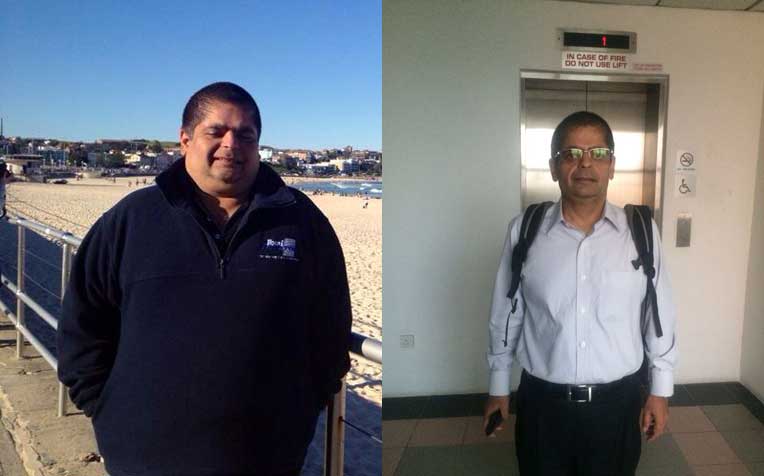
Bariatric surgery helped him to control his diet.
Throughout his adult life, Mr Sanjeev Gathani’s weight was like a yo-yo.
The expansion phases could be drastic at times: During a business trip, he put on so much weight that he had to get new clothes tailored there. He had up to five bowel movements a day due to the sheer amount of food he consumed.
At his heaviest, Mr Gathani weighed 120 kg. But he overcame the odds and now stands at 68 kg (for 1.65m) after undergoing a life-changing bariatric surgery.
“I had to wear shoes without shoelaces. My wife never said anything about my weight, but it obviously created problems for us in the bedroom. My looks also made me insecure; I was afraid she’d leave me. People called us ‘Beauty and the Beast’ behind my back,” reflects Mr Gathani.
In February 2013, after yet another embarrassing flight where he couldn’t fit into his seat, Mr Gathani decided to get bariatric surgery to reduce the size of his stomach. He wanted to get it done ASAP, but the surgeon told him to mull it over as it was a life-altering experience. “He was so right, but I just wanted the results, and fast,” Mr Gathani says.
The surgery was finally scheduled five months later, after a battery of assessments.
The interesting thing about the operation is that Mr Gathani only told his wife about it 45 minutes before he was due at the hospital. “I didn’t want her – or my parents – to worry or try to talk me out of it,” he says.
Not telling anyone was also a way to avoid thinking too much about the surgery and its implications on his lifestyle. From the time he signed up, Mr Gathani was supposed to gradually cut his food intake. But he never did. In fact, when he was told to start using some meal replacements, he had them on top of his regular meals.
Before the surgery, Mr Gathani’s breakfast on a typical day would consist of 6-8 slices of bread with cheese or jam. Lunch would be 2 bowls of rice with deep-fried veggies and curry. Dinner would be another 2 bowls of rice, plus dahl and chapatti. He also had a snack and a kopi in the morning and afternoon.
The operation was a success, but coming to terms with a new reality – one in which he was forced to eat much less and much slower due to his smaller stomach – was traumatising. “I should have listened to my doctor and been better prepared,” reckons Mr Gathani.
But while it took a lot of support from his medical team and family, Mr Gathani pulled through and now enjoys a new, super fit life: “Things are great with my wife, and my sons look up to me. I’ve never been happier.”
| Fact Sheet on Sanjeev Gathani | |
|---|---|
| Personal data : | Age 44, married, 2 children |
| Occupation : | Auditor |
| Hobbies : | Running, swimming, cycling and traveling |
| Cool fact : | He’s into marathon running and is training for an Ironman triathlon set in December 2015 |
What are your best 3 tips for obese people considering bariatric surgery?
- Make sure you prep yourself psychologically.
My life used to revolve around eating. I ate a lot, and I ate very fast. Only after the surgery did it finally sink in that things had to change. I had buried my head in the sand, eating as per usual until the very night before the op. The first night I came home after the surgery, I actually considered jumping from my bedroom window when all of this dawned on me. My son saved my life by coming into my room at the right time.
- Start exercising before your operation.
Exercise will expedite your recovery and go a long way towards preventing skin laxity when the weight rapidly comes off after surgery. Despite my extra weight, I had started exercising when I was 35, some eight years before the surgery. So after the op, I didn’t have much issues resuming exercise. Now, I play squash twice a week and run three times a week at a much faster pace than before. I also continue to walk twice a day for at least a total of one hour, which is the most basic recommendation you should implement.
- Have a support system in place.
On the day of my op, I went to the hospital alone and I was very scared. In the prep room, my blood pressure sky-rocketed. Even after the surgery, the first month was one hell of a ride. Trust me, you will need all the support you can get. If I could go back in time, I would discuss the matter in advance with my wife. I’m so grateful that she still supported me after everything that happened. I also owe my life to my surgeon and my dietician who remained extremely supportive despite my stubbornness. I wouldn’t be where I am today without these people.
Related articles
- Weight Loss Surgery: Pros and Cons
- Exercise to Lose Weight: Burn Calories Indoors
- Weight Loss and Exercise
- What to Eat to Lose Fat and Boost Your Metabolism
- Healthy Local Breakfast Choices
Ref: R14
Contributed by














 Get it on Google Play
Get it on Google Play